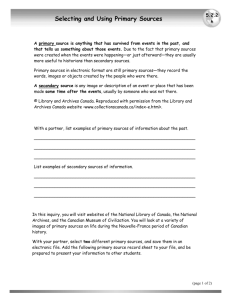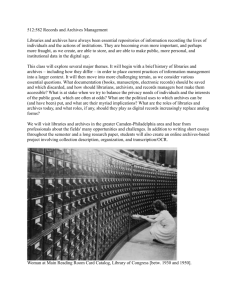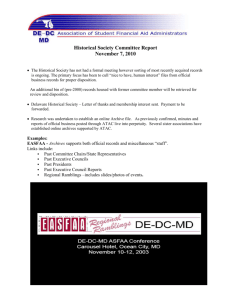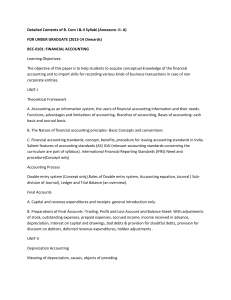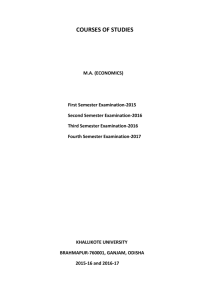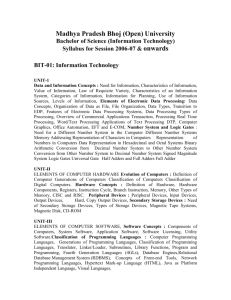M.PHIL. HISTORY CURRICULUM Sl.No Papers Max. Marks Time 1
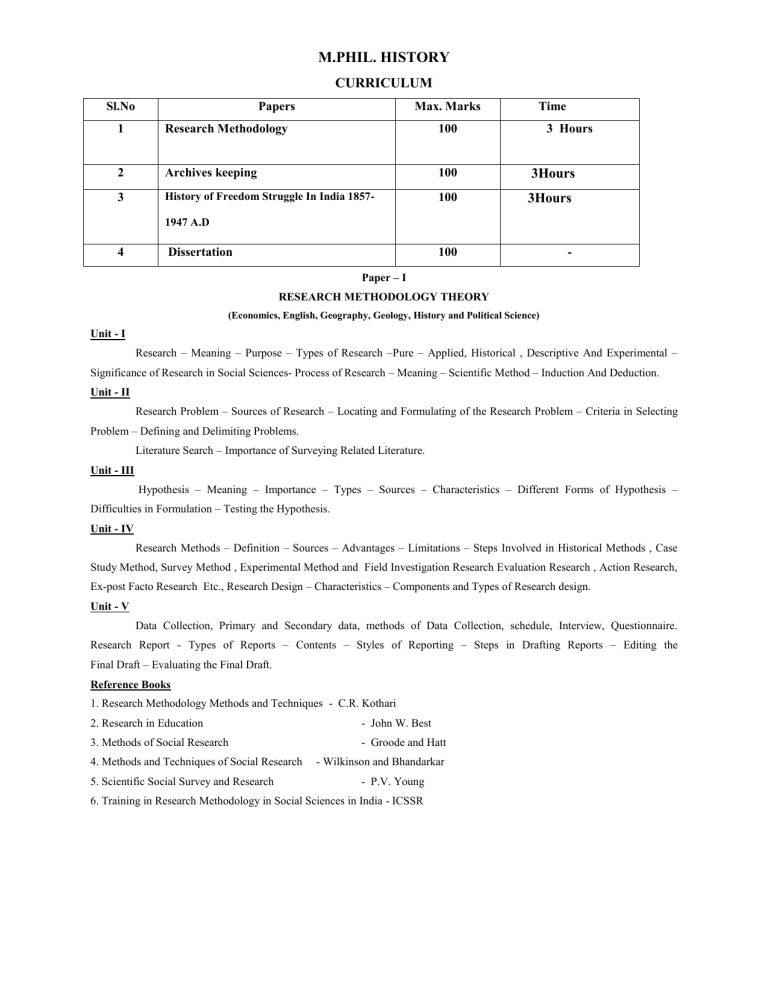
Sl.No
1
2
3
Papers
Research Methodology
M.PHIL. HISTORY
CURRICULUM
Max. Marks
100
Archives keeping
History of Freedom Struggle In India 1857-
1947 A.D
100
100
Time
3 Hours
3Hours
3Hours
4 Dissertation 100
Paper – I
RESEARCH METHODOLOGY THEORY
(Economics, English, Geography, Geology, History and Political Science)
-
Unit - I
Research – Meaning – Purpose – Types of Research –Pure – Applied, Historical , Descriptive And Experimental –
Significance of Research in Social Sciences- Process of Research – Meaning – Scientific Method – Induction And Deduction.
Unit - II
Research Problem – Sources of Research – Locating and Formulating of the Research Problem – Criteria in Selecting
Problem – Defining and Delimiting Problems.
Literature Search – Importance of Surveying Related Literature.
Unit - III
Hypothesis – Meaning – Importance – Types – Sources – Characteristics – Different Forms of Hypothesis –
Difficulties in Formulation – Testing the Hypothesis.
Unit - IV
Research Methods – Definition – Sources – Advantages – Limitations – Steps Involved in Historical Methods , Case
Study Method, Survey Method , Experimental Method and Field Investigation Research Evaluation Research , Action Research,
Ex-post Facto Research Etc., Research Design – Characteristics – Components and Types of Research design.
Unit - V
Data Collection, Primary and Secondary data, methods of Data Collection, schedule, Interview, Questionnaire.
Research Report - Types of Reports – Contents – Styles of Reporting – Steps in Drafting Reports – Editing the
Final Draft – Evaluating the Final Draft.
Reference Books
1. Research Methodology Methods and Techniques - C.R. Kothari
2. Research in Education
3. Methods of Social Research
- John W. Best
- Groode and Hatt
4. Methods and Techniques of Social Research - Wilkinson and Bhandarkar
5. Scientific Social Survey and Research - P.V. Young
6. Training in Research Methodology in Social Sciences in India - ICSSR
Paper-II
Archives keeping
Unit-I
Unit-I Definition of Archives- Creation of Archive (history) – various types of Archives
– Materials – materials used for creation- Birth of a Document.
Unit-II
Preservation Techniques – Enemies of Records – Rehabilitation of Records – Functions of Archivist –Uses of Archives.
Unit-III
Rules relating to accession of records in Archives – Appraisal of Records – Retention schedule- Compilation and Publication.
Unit-IV
Various aspects of records management such as Documentation practices and filling system, lifecycle of a file and nature of modern records, Classification of records and Methods of control on mass production
Unit-V
National Archives of India and Tamil Nadu State Archives- Requirement of Record room Administration of Tamilnadu Archives – Field work.
Reference:
1.
Cook, Michael, “ Archives Administration “ Dawson UKI Ltd
2.
Hodson ,John V.K.an Introduction to use of Public Records “ Oxford clerandon press,
1934.
3.
Jenkinson Hilary , An Introduction to use of public records “ Oxford clerandon press,
1934.
4.
Kshn, Gilbert, Filling system and Record Management” 2 nd
ed .New york,1971
5.
Macmillan, David (Ed) “ Archives, Techniques and function in a modern society”
Sydney,1957.
6.
management of Information from Archives , Gower, London.
Part-III
History of Freedom Struggle In India 1857-1947 A.D
Unit-I
Genesis of the Indian Nationalism – Socio –Economic and Political Factors Responsible for the Genesis of the Indian Nationalism –
British Administration and Land Revenue Settlements – Western Education and Growth of Communication
Unit-II
The Great Revolt of 1857- Causes and consequences – Transfer of power- Formation and Growth of Indian National Congress –
Moderates and Extremists – GokHale Dadabhai Naoroji, B.G. Tilk, Bipin Chandrapal, Lalalajpat Rai Arabindo Ghose.
Unit-III
Partition of Bengal and its Impacts – Swadeshi Movement – Surat Split- Terrorists Movement – Home Rule Movement- Annie-
Besant Tilak.
Unit-IV
Rowlatt Act – Jallin wala bag massacre – E mergence of Gandhi – Khilafat- Movement
Non-Co-Operation Movement –Constructive Programmes
Unit-V
Swaraj Party – Simon Commission- Round Table Conferences – Civil Disobedience Movement- Dandi Salt Satygraha – Election of
1937
Unit-VI
Individual Satyagraha – Quit India Movement – Indian National Army- Netaji Subash Chandra Bose – Cabinet Mission plan –
Interim Government - Simla Conferences – Conference- Mount Battern Plan – Indian Independence Act of 1947- Freedom and Partition
Unit-VII
Genesis of Freedom struggle of Tamilnadu – Tamil Nationalists – V.V.S. Iyer, G.Subramanayar lyer, Subramanya .sive, Nilakanta
Brahmachari, Vanchinathan V.O.C Bharathi –Home Rule Movement
Unit-VIII
Non-Co- Operation Movement – Vijayaragavachari- Rajaji – E.V.R. and Kamaraj –Constructive programmes – Civil Disobedience
Movement – Rajaji –Vedaranyam Salt Satyagraha – Justice Party – Disobedience Movement –Rajaji- Vedaranyam salt satyagraha – Justice Party
– Individual satyagraha – Quit India Movement – Congress Monasteries in
TamilNadu.
Text Books
1.Chopra P.N (ed) India’s Struggle for Freedom, Delhi Agm Prakasham 2985.
2.Mahajan V.D National Movement in India’s New Delhi, Sterling Publishers 1981
3.Tarachand History of Freedom Movement in India New Delhi Vikas Publishing House 1983.
Reference Books
1.
Phillips C.H . The Evolution of India and Pakistan 1858-1948 Select Documents, London, Oxford University Press 1962.
2.
Philips C.H and M.D Wainwright (eds) The Partition of India Policies and Perspectives 1935-1948 Cambridge M.I.T Press
1970..
